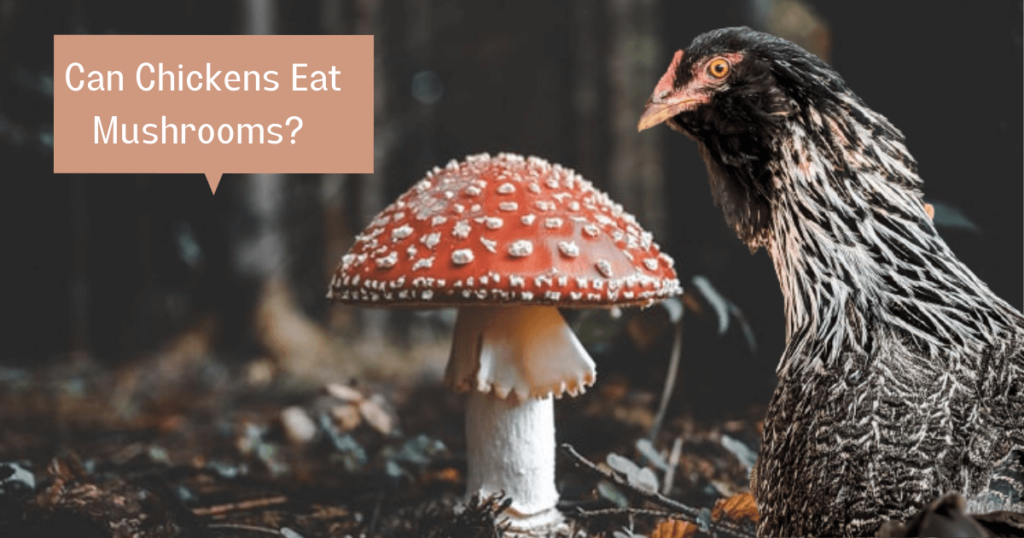We often think mushrooms are poisonous, but some types are safe for chickens to eat and even quite nutritious! Chickens can eat both the fleshy parts of the edible mushroom as well as the stems. However, if you’re unsure whether or not a mushroom is safe, it’s best to err on the side of caution and not feed it to your chickens.
The quick answer is yes AND no. Typically store bought mushrooms are okay while many wild ones are not. Continue reading for a deep dive into mushroom types and nutritional benefits.
What is a Mushroom?
Mushrooms are fungus that typically grows in damp, dark areas. There are over 10,000 different types of mushrooms, and not all of them are edible. Some can be quite poisonous.
Mushroom Nutrition Value
A typical mushroom is about 90% water, 2% protein, 0.3% fat, and 3% carbohydrates. They’re low in calories and rich in protein and fiber. They also contain small amounts of vitamins and minerals, including vitamin D, potassium, and selenium which can help protect against cancer cells.
It is one of the few plant-based foods containing vitamin D, making it an excellent source of protein for vegetarians. One cup provides you with over 60% of your daily requirement for vitamin D3.
You can find them fresh, canned, or dried in most supermarkets and are present in pizza toppings, soups, and sauces. Snacks like mushroom chips and crackers are also available.
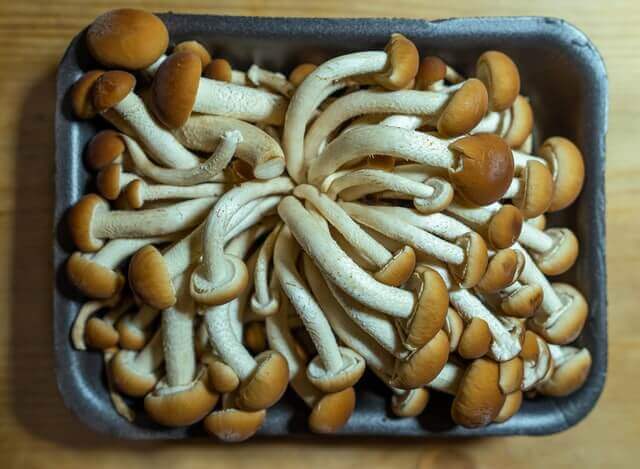
Best Types of Mushrooms Edible to Chickens
While there are many edible mushrooms, not all of them are safe for chickens. The best mushrooms for your flock are oyster, shiitake, and maitake mushrooms. These are safe for the flock to consume, and they’re also rich in nutrients.
Oyster Mushrooms
Oyster mushrooms are edible fungi that get their name from their oyster-shaped cap. They are often present in moist, dark places like forests and caves. These mushrooms are safe for chickens to eat and are a good source of protein, fiber, and vitamins B and C.
These edible mushrooms also contain small amounts of copper, potassium, and selenium.
Shiitake or Shitake Mushrooms
The shiitake is a type of edible fungi native to East Asia. Its name comes from the Japanese word “shii,” meaning “tree.” This name signifies that you can find them on trees in forests and woodlands with many soggy soil conditions.
This species can be seen as either black with brown markings or white-colored without any apparent patterns/scales throughout its exterior surface layer (known popularly simply just ‘the cap’). But whichever variety you decide upon will taste delicious if cooked right!
Shiitake mushrooms are consumable. It was FDA-approved for human consumption in 2013-2014, thus it is also healthy for your flock.
Maitake Mushrooms
Maitake mushrooms are an ancient type of fungus found all over East Asia. These fungi have been eaten for generations and continue to rank high on many people’s lists as one of their favorite ingredients in everyday cooking.
The health benefits of maitakes are not limited to humans. Chickens love them, too!
Mushrooms are rich in protein and fiber. It makes up for their low-fat content and provides your bird with B-Vitamins that help maintain feathers and egg-laying ability.
Also, it has been proven that these mushrooms will boost the meat quality in any fowl since they contain zinc.
Other Types of Safe Mushrooms
Some safe wild ones include:
-Agaricus bisporus (white button Mush.)
-Pleurotus ostreatus (oyster Mush.)
– Lentinula edodes (shiitake Mush.)
-Hericium Erinaceus (lion’s mane Mush.)
-Grifola frondosa (maitake Mush.)
Are There Any Types of Mushrooms That Chickens Should Avoid?
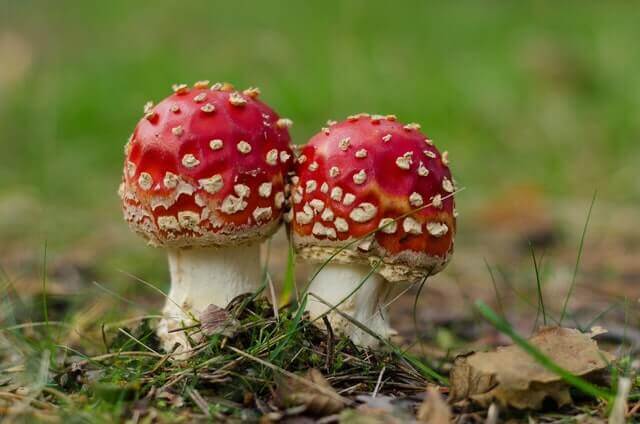
Yes, there are some types of mushrooms that poultry keepers should avoid at all costs. These include the following:
Death Cap Mushroom
The death cap is one of the most toxic fungi around. It’s also named for its tendency to cause deaths in people and animals who eat them, though not always directly.
It is a delicate, white fungus with yellowish-green sunhats that grow in wooded areas. It’s responsible for poisoning many chickens that come into contact by accident or on purpose as a food source. It is poisonous to chickens and sometimes causes liver failure or other serious medical problems.
Destroying Angel Mushroom
The destroying angel is one of the most poisonous mushrooms. It can kill you if eaten, especially by animals like cats, dogs, and even chickens! The caps are all-white with a bulbous stem, growing near streams or rivers in wooded areas.
Fool’s Webcap Mushroom
The fool’s webcap is a poisonous fungus native to Europe. It is white with a greenish-yellow cap, and it typically grows in wooded areas. It is toxic to poultry. When you inhale this stuff, the entire fruiting body smells terrible. A single spore produces enough toxins for an animal of any size to be poisoned.
What Are Some Examples of Wild and Poisonous Mushrooms?
While not all wild mushrooms are poisonous, it is crucial to be aware that some are.
Some examples of poisonous fungi include:
-Amanita phalloides (death cap)
-Conocybe filaris (fool’s webcap)
-Galerina marginata (deadly galerina)
-Chlorophyllum molybdites (green-spored lepiota)
-Inocybe spp. (inocybes)
-Psilocybe spp. (psilocybes)
Are Store-Bought Mushrooms Safe for Chickens?
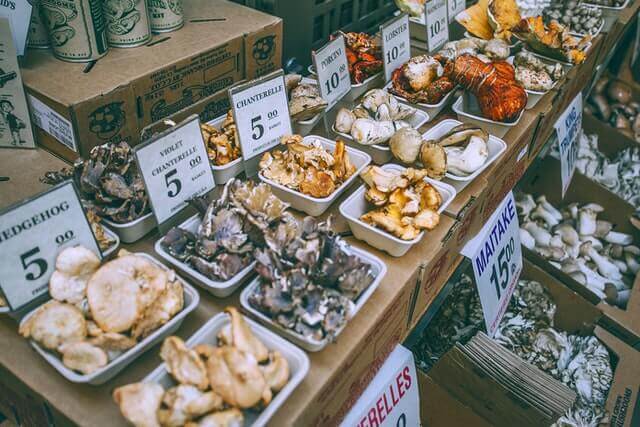
Store-bought mushrooms are typically safe for your backyard chickens to eat. However, it’s important to check the label to ensure that the mushrooms don’t contain harmful chemicals or pesticides. You should also wash the mushrooms thoroughly before feeding them to your poultry in their chicken feeder.
Can Chickens Eat Wild mushrooms?
When you feed your flock wild mushrooms, make sure you identify poisonous ones before feeding them to your chickens so that they do not get ill or die.
If there is any uncertainty about which type a particular toadstool fits into, avoid giving it to your flock rather than risking death by poisoning. Or, do some research on identifying the consumable species of toadstool if you’re looking to add some variety to your chicken’s diet.
Effects of Eating Poisonous Mushrooms
Contact a veterinarian immediately if you think your flock has eaten a poisonous mushroom. Symptoms of poisoning in chickens can include:
- Lethargy
- Loss of appetite
- Vomiting
- Diarrhea
- Jaundice (yellowing of the skin and eyes)
- Seizures
- Coma
- Death
How to Identify the Wild Mushrooms?
If you’re unsure whether or not a wild mushroom is safe for your flock, there are some ways you can identify safe toadstools for chickens.
- First, look for mushrooms that have a cap and stem.
- Second, make sure it has a uniform color.
- Third, look for mushrooms with gills on the underside of the cap.
- Fourth, smell it. If it has a strong or unpleasant odor, it’s best to avoid feeding it to your poultry.
- Finally, touch it. If it leaves a stain on your skin, it’s best to avoid it.
If you’re still unsure whether or not a mushroom is safe for your flock, it’s best to consult with a professional.
What Are the Benefits of Eating Mushrooms for Chickens?
Below are the health advantages of mushrooms to chickens:
- Raw mushrooms are a good source of protein, fiber, and vitamins B and C.
- They also contain small amounts of copper, potassium, and selenium.
- Feeding mushrooms to your chicken can help boost their immune system and keep them healthy.
- Maitake mushrooms have been shown to lower cholesterol levels in chickens.
- Shiitake mushrooms have been shown to help improve the quality of eggshells in chickens.
- Some edible toadstools can also help chickens resistant to salmonella and other diseases. This is due to substances found in mushrooms called beta-glucans, which stimulate the immune system.
- Mushrooms are a low-calorie food, so they can help chickens maintain a healthy weight.
- Mushrooms are also a good source of antioxidants, which can help protect chickens from cell damage and disease.
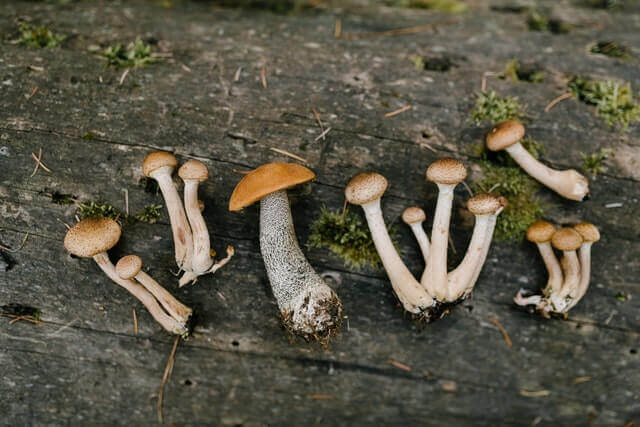
What Are the Disadvantages of Feeding Chickens Mushrooms?
There are a few disadvantages of feeding mushrooms to chickens.
- First, some wild mushrooms are poisonous and can cause liver failure and death.
- Second, mushrooms can be a choking hazard for chickens. If you feed your flock uncooked mushrooms, chop them into small pieces to avoid this.
- Finally, mushrooms can be a bit pricey, so you may want to limit the amount you feed your flock if you’re on a budget.
How to Feed Chickens Mushrooms?
If you want to feed your chicken mushrooms, there are a few things you need to keep in mind.
First, make sure that the mushrooms you’re feeding are safe and edible. Only give them that have been appropriately identified as safe for chickens. Wash them thoroughly before feeding them to your flock.
Second, chop the fruiting body into small pieces to avoid choking hazards.
Lastly, it’s okay to give store-bought mushrooms as most are typically safe for chickens to eat. Still, check the label to ensure that they don’t contain any harmful chemicals or pesticides.
If in doubt, don’t feed it to your poultry.
How to Serve Mushroom to Chickens?
You can feed mushrooms to your flock in several different ways. You can add them to their regular food or give them as a treat.
Mushrooms are usually safe to eat raw, but some people prefer to cook them first. This is because cooking mushrooms can help release their nutrients and make them easier to digest.
Cooked
If you choose to feed your flock cooked mushrooms, you can fry, bake, or boil them.
Boiling:
Boil them in water for 10 minutes. Remove from heat and let cool before feeding your poultry.
Steaming:
Place toadstools in a steamer basket and steam for 10 minutes. Remove from heat and let cool before feeding your flock.
Roasting:
Preheat the oven to 400 degrees Fahrenheit. Place the mushrooms on a baking sheet and roast for 10 minutes. Remove from heat and let cool before feeding your flock.
Frying:
Heat oil in a pan over medium heat, then add the mushrooms and cook for 10 minutes. Safely remove from heat and let cool before feeding your poultry.
Uncooked
You can also feed your poultry raw mushrooms. Wash the mushroom and remove the stem. Chop it into small pieces and add it to your chicken’s food.
Dried
Yes, there are dried mushrooms for chickens. Dried ones have the same nutritional value as fresh ones. They need to be rehydrated before feeding them to your chicken.
To rehydrate the dried mushroom, soak it in water for 10 minutes. Remove from water and let cool before chopping into small pieces and adding it to your chicken’s food.
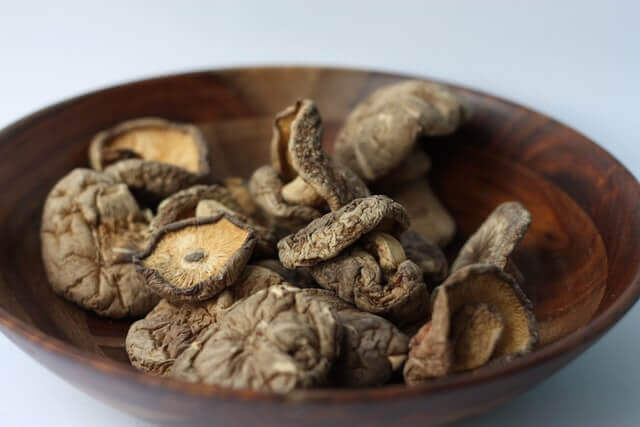
Are they all cultivated mushrooms?
No, not all mushrooms are cultivated. Some grow naturally in the wild. However, it’s important to be aware that not all wild toadstools are safe for chickens to eat. Some are poisonous and can cause liver failure and death. If you’re unsure whether or not a mushroom is safe for your chicken, it’s best to err on the side of caution and avoid feeding it to them.
Making Your Own Mushroom Logs for Chickens
If you want to grow your own mushrooms for chickens, you can do so by making your own mushroom logs:
- Find some logs about 4 feet long and 6 inches in diameter.
- Drill holes into the logs about 2 inches apart.
- Insert some spores into the holes.
- Place the logs in a shady area and mist them with water every day.
In about six weeks, you should see mushrooms growing on the logs. Once they are big enough to eat, your chickens can enjoy them.
The logs are a great way to provide your chickens with a healthy and nutritious treat. Plus, they’re easy to make and don’t require much maintenance.
FAQ’s
Can Foraging Chickens Eat Mushrooms?
Yes, foraging chickens can eat mushrooms. However, it’s important to ensure that they are safe for chickens. Some wild mushrooms are poisonous and can cause liver failure and death. If you’re unsure whether or not a mushroom is safe for your chicken, it’s best to err on the side of caution and avoid feeding it to them.
Can Baby chickens Eat mushrooms?
Yes, baby chicks can eat mushrooms. Make sure that they are chopped into small pieces to avoid choking hazards.
How often can chickens eat mushrooms?
Chickens can eat mushrooms as often as you like. Just make sure that the mushrooms are cooked thoroughly and do not feed your chicken poisonous fungi.
Final Thoughts: Can Chickens Eat Mushrooms?
Mushrooms can be a healthy and nutritious treat for your chicken. Just make sure that you’re feeding them safe mushrooms and preparing them properly. If you have any concerns about feeding mushrooms to your chicken, it’s best to consult with a veterinarian.

